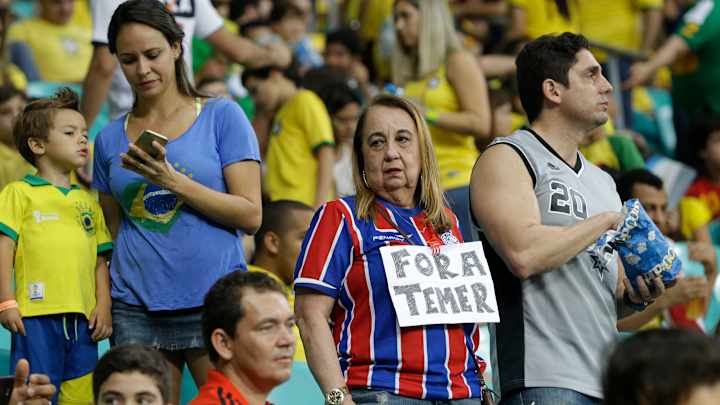Brazilian politicians skip Olympics amid bad mood of country

RIO DE JANEIRO (AP) The Olympics are normally a prime place for politicians to schmooze, tout their work and bask in the limelight in hopes of boosting popularity or gearing up for a re-election bid.
But a presidential impeachment trial and widespread anger over corruption and a tanking economy are making for strange times in Brazil. Top politicians have stayed away from Olympic venues and stayed mostly silent on social media.
The Aug. 5 opening ceremony was the last time a top Brazilian politician was seen anywhere near an Olympic event, and it didn't go well: Interim President Michel Temer was blasted with boos by thousands at Maracana Stadium when he declared the games open.
Since then, he has congratulated Brazilian medal winners on Twitter and visited the media center but has otherwise stayed holed up in the capital of Brasilia. Temer aides confirmed that he won't attend Sunday's closing ceremony.
Suspended President Dilma Rousseff has also stayed away. Rousseff was impeached in May for breaking fiscal rules in her management of the federal budget. Rousseff has repeatedly denied wrongdoing, calling the movement to remove her ''coup.''
Next Thursday, just days after the games end, the Senate is expected to begin several days of debate that will culminate in a vote on whether Rousseff is permanently removed. Brazil's first female president was invited to the opening ceremony but chose not to attend, in her words, ''in a secondary position.''
Alexandre Barros, a political consultant in Brasilia, said the unsettled political situation has likely paralyzed Temer and Rousseff, as it has the country over the past year.
''We have a suspended president, an interim president and another former president with an uncertain future,'' said Rousseff, referring to ex-President Luiz Inacio Lula da Silva. ''Nobody knows who is in charge.''
Silva spearheaded Rio's winning Olympic bid in 2009, but his popularity tanked when he got caught up in the probe of a kickback scheme at state oil company Petrobras. He now faces a trial on obstruction of justice charges, and the man most responsible for getting the games to Rio has not attended any event.
Both Rousseff and Temer have also been at the epicenter of the colossal investigation that has led to the jailing of dozens of politicians and top businessmen. Much of the corruption at Petrobras happened during the 13 years that Rousseff's Workers' Party was in office. While Rousseff has not been personally implicated, many blame her for not doing more.
Temer, meantime, has been fingered for bribery by witnesses who have reached plea deals with prosecutors, though so far he has not been charged.
Brazilians have a lot to be mad about. Latin America's most-populous nation is mired in its worst recession in decades. Inflation remains high, and layoffs are a daily occurrence. The Zika virus, which kept some Olympic athletes away, has ravaged thousands of families in poor, northeastern states. And the political crisis has both exacerbated problems and made enacting much-needed reforms all but impossible.
The AWOL politicians stand in stark contrast to the two previous Olympic Games in Beijing and London, when leaders were often seen making the rounds. Just think of then-London Mayor Boris Johnson dangling from a zip-wire in Victoria Park during the 2012 Summer Games.
In Rio, even lower-level ministers - including the sports minister - stayed away.
Said Sen. Camilo Capiberibe of the Brazilian Socialist Party: ''People don't feel represented by us. They don't want us in the Olympic arenas because they feel we didn't help'' make things better in Brazil.
---
Mauricio Savarese on Twitter: http://twitter.com/MSavarese
Peter Prengaman on Twitter: http://twitter.com/peterprengaman
